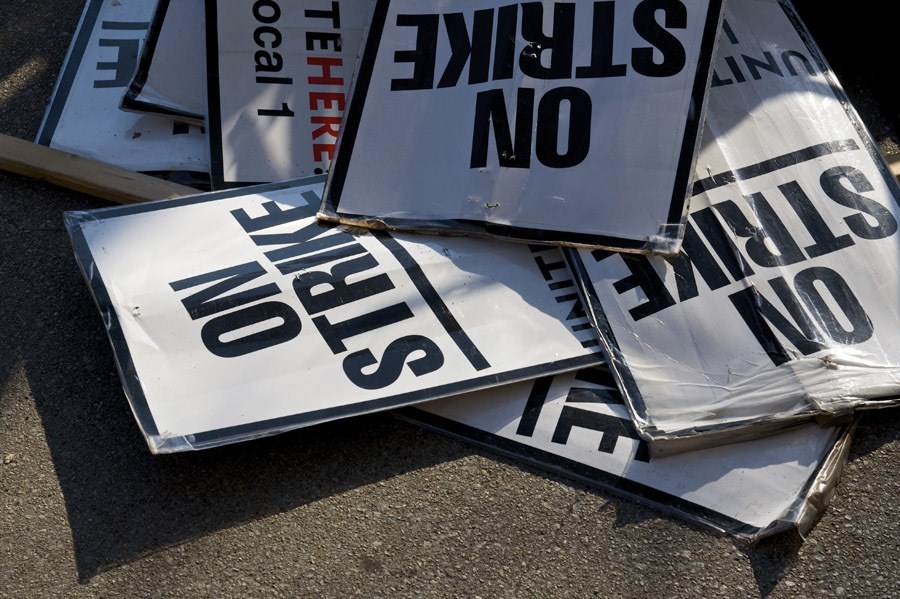UNBC Faculty Association negotiations resumed Thursday morning at the Ramada Plaza Convention Centre for the first significant talks since the faculty tabled its latest offer on Monday after rejecting UNBC's latest settlement proposal earlier that day.
While there is agreement on both sides of the need to restructure the contract to address the concerns of tenured and tenure-track professors that their yearly salary increases are not keeping pace with that of their peers in comparable universities, UNBC, in an update posted Wednesday on its website, said there is a fundamental misunderstanding on whether the two sides have agreed on salary structure.
"Both teams know that the funding envelope must fall within the province’s mandate, but there is a disconnect regarding the compensation structure, how that funding is spread across the membership, and the long-term financial implications of that structure," the update reads.
"For more than a year, a joint working group comprised of FA and Employer representatives developed principles and benchmarks that would lead to a much-needed adjustment to the salary structure for tenured and tenure-track faculty.
"As a result, that is why the Employer has continued to refine its proposals that are built upon the shared principles between the FA and the employer that emerged from that working group. Most importantly, that the salary structure ultimately supports the recruitment and retention of outstanding faculty."
Administration also stressed the importance of taking time to examine each counteroffer to determine exactly how it will affect the university's budget and spent most of the past two days reviewing details of the FA's latest offer.
"Due diligence includes tracking each article in detail so both parties know if words have been deleted or inserted," said the UNBC website post. "This means the employer’s team has an obligation to review each word carefully and thoroughly, as changes to words can mean changes to the compensation envelope. Finally, the product of all of this work must then be reviewed and approved by the Public Sector Employer’s Council Secretariat."
FA president Stephen Rader said this morning he can't understand why UNBC president Daniel Weeks has not been directly involved in negotiations. He wants Weeks at the bargaining table because his academic background gives him a level of understanding no other UNBC administrator can bring to those discussions.
"He's the one person in the administration who really understands academics," said Rader. "He should understand the impact this is having on our students and the future of the university, frankly, to keep us out on the picket lines.
"One of the things that's really disappointing is after the last strike (which went on for two weeks in March 2015), he made zero effort at rebuilding ties with the faculty. He was able to get us all on the same page working together we would have no problem turning the university around."
A week ago UNBC agreed to bump annual salary increments to professors from $1,100 in the expired to contract to $2,700. Those salary increments are the reason UNBC salaries have not kept pace with other comparable universities.
In addition to compensation, the other major issue is recruitment jurisdictions and who ultimately decides on promotions and future hiring of new faculty members. Administration wants that control over hiring which has traditionally been left up to professors in each of their respective disciplines.
"Salary restructuring was the main issue that needed to be solved this time around and on top of that (Weeks) and his administration decided they wanted to come after our rights," said Rader. "This would have been a three-week round of bargaining if they hadn't done that. Instead it's taken eight months and ended up with us on strike."
UNBC spokesman Matt Wood said neither Weeks nor any other administrator or board member were available for comment to avoid the possibility of hindering progress at the bargaining table.
The 2015 strike was suspended after two weeks when UNBC administration called in the Labour Relations Board to end it in a process only permitted for first collective agreements. That mechanism is not available to the two sides this time around.
Now into its 15th day, Rader is concerned about a prolonged strike and the effect it will have, particularly on nursing and social work students now missing practicums which are required to go on to the next semester.
"It took the administration three days to get back to us on our last offer," said Rader. "Needless to say, we're pretty disappointed given all of the people who are out of work right now and all of the students who are desperately waiting for the semester to resume.
"They put out a labour relations update (Wednesday) talking about having to comb through every word to do their due diligence. Have they only started doing that now? I don't know what that's about."



